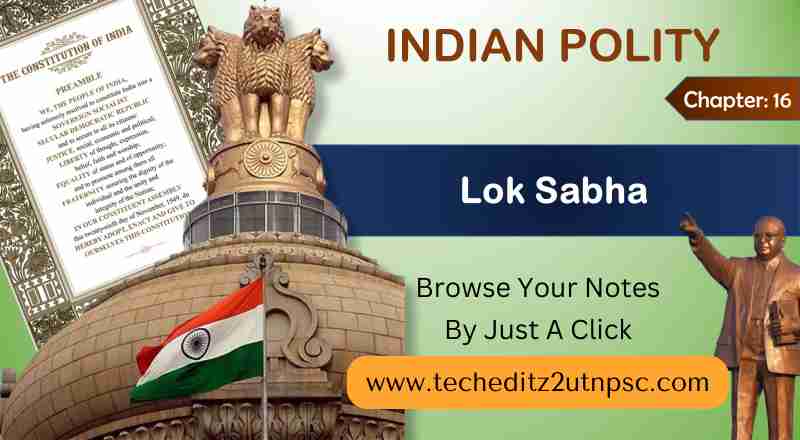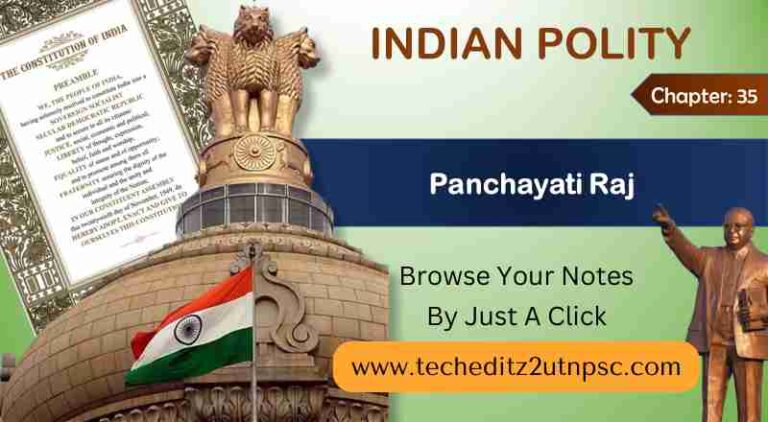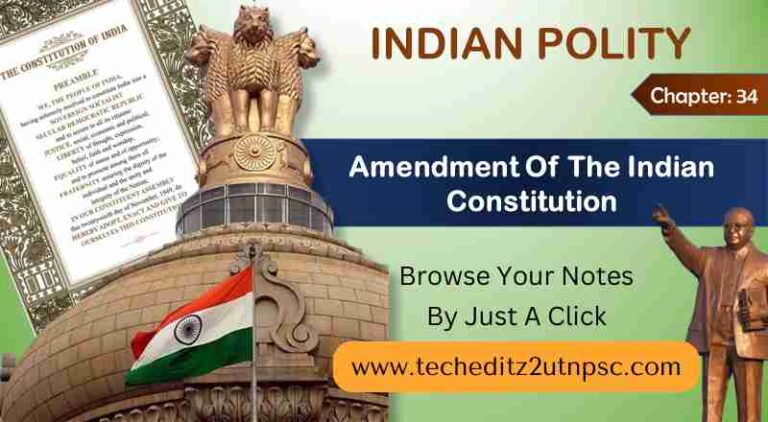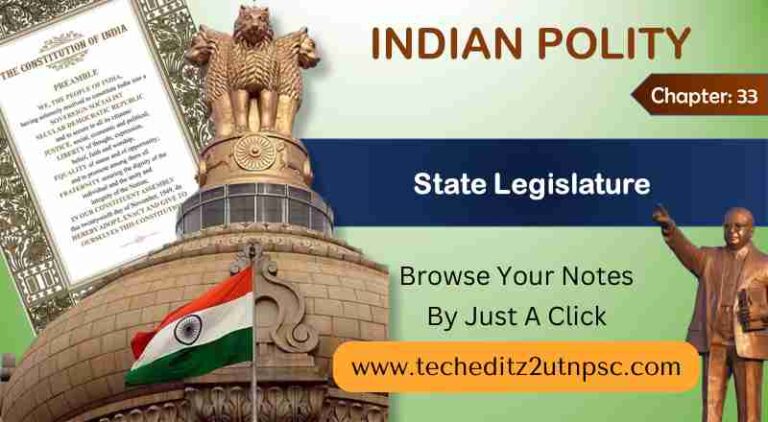support@techeditz2utnpsc.com | 8300-921-521

Lok Sabha
Indian Polity
Chapter 16: Lok Sabha
Lok Sabha
- This is also called the Lower House of the parliament.
- The maximum strength of Lok Sabha is 552.
- Out of this 530 are the representatives of states directly elected by the people.
- 20 members are the representatives of Union Territories directly elected by the people.
- Remaining 2 members are nominated by the President from the Anglo-Indian community.
- The nominated members in the 15th Lok Sabha are Smt. Ingrid Mcleod and Shri Charles Dias.
- Present strength of Loksabha is 545 (530 (states) +13 (UT’S) + 2 (nominated).
- All the citizens of India who are above the age of 18 are eligible to vote. Initially the voting age was fixed at 21. Through 61st constitutional amendment this was reduced to 18.
- The provision to nominate Anglo-Indians was to operate till 1960 only. Periodically it has been extended 10 years through the constitutional amendments.
- Now it has been extended up to 2020 through 109th amendment of the constitution.
- The number of seats in Lok Sabha must be readjusted after every census. In India the Census operation is Conducted every 10 years
- Accordingly the Parliament enacted the Delimitation Commission Acts in 1952, 1962, 1972 and 2002 for this purpose.
- 42nd Constitutional amendment Act of 1976 froze the allocation of seats in the Lok Sabha to the states and the division of each state into territorial constituencies till the year 2000 at the 1971 census level.
- 84th Constitutional amendment Act of 2001 it was readjusted and the number of seats in Lok Sabha frozen up to the year 2026.
- The Constitution provided the reservation of seats for Schedule castes and Scheduled tribes in the Lok Sabha on the basis of population ratio.
- The term of Lok sabha is 5 years from the date of its first meeting after general elections.
- The President can dissolve the Lok Sabha at any time before the completion of 5 years. (Mid term election).
- The term of Lok Sabha can be extended by the Parliament during National Emergency. This is for one year at a time for any length of time.
Qualifications:
- Must be a citizen of India.
- Must not less than 25 years of age.
- Must possess other qualifications as prescribed by the Parliament.
Additional qualifications:
- The Parliament has laid down additional qualifications in the Representation of Peoples Act of 1951.
- Must be registered as an elector for some parliamentary constituency in India.
Disqualifications (Article 102)
- If holds any office of profit under the Union or State government.
- If the person is of unsound mind and stands so declared by a court.
- If the person is an un-discharged insolvent.
- If the person is not a citizen of Indian or has voluntarily acquired the citizenship of a foreign state.
- If so disqualified under any law made by the Parliament.
Composition:
- With relation to the above disqualification the decision of the President is final after obtaining the opinion of the election commission.
- Andaman and Nicobar Islands – 1
- Andhra Pradesh – 42
- Arunachal Pradesh – 2
- Assam – 14
- Bihar – 40
- Chandigarh – 1
- Chhattisgarh – 11
- Dadra and Nagar Haveli – 1
- Daman and Diu – 1
- Delhi – 7
- Goa – 2
- Gujarat – 26
- Haryana – 10
- Himachal Pradesh – 4
- Jammu and Kashmir – 6
- Jharkhand – 14
- Karnataka – 28
- Kerala – 20
- Lakshadweep – 1
- Madhya Pradesh – 29
- Maharashtra – 48
- Manipur – 2
- Meghalaya – 2
- Mizoram – 1
- Nagaland – 1
- Orissa – 21
- Pondichherry – 1
- Punjab – 13
- Rajasthan – 25
- Sikkim – 1
- Tamil Nadu – 39
- Tripura – 2
- Uttar Pradesh – 80
- Uttarakhand – 5
- West Bengal – 42
Miscellaneous:
- Out of the 543 MPs elected in 2009, at least 162, or 30%, have criminal cases pending against them.
- This was more than those elected in 2004 when 128, or 24%, had pending criminal cases.
Visit Our YouTube Channel For More Free Videos: Click Here
ADVERTISEMENT


